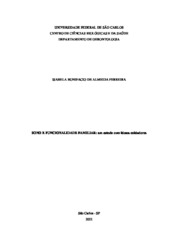Sono e funcionalidade familiar: um estudo com idosos cuidadores

View/
Date
2021-10-28Author
Ferreira, Isabela Bonifácio de Almeida
Metadata
Show full item recordAbstract
In the Brazilian context, older people care is culturally handled by a family member. Given the
recent new family arrangements and the aging of the population, the number of older adults
taking care of other older people is increasing. However, the responsibility of care can arise
suddenly, and the family caregiver is not always able to assume this responsibility. In this case,
the family members may not organize themselves, resulting in conflicts, disharmony, and
consequent family dysfunction. Researchers claim that a dysfunctional context can have a
negative impact on individuals’ physical health and, consequently, the caregivers' sleep may be
negatively affected. Therefore, both family dysfunction and sleep issues among caregivers can
interfere in the quality of the provided care, especially in contexts of poverty. Objective:
analyzing the relationship between sleep and family functionality of older caregivers registered
in Family Health Units in a context of high social vulnerability. Method: cross-sectional study,
based on quantitative research assumptions, carried out in a countryside city in the state of São
Paulo - BR. This is an excerpt from a larger study, in which 65 older adults aged 60 years or
older participated, registered and residing in the urban area covered by the Family Health Units
and who take care of other older adult. Data collection was performed in the older adult houses,
in a place provided by the family from July/2019 to March/2020. The following instruments
were used for the individual interviews: Questionnaire to characterize both the elderly caregiver
and the care context, Pittsburgh Sleep Quality Index (PSQI) to assess sleep quality and Family
APGAR to assess family functionality. Divergencies between groups were analyzed using
Pearson’s Chi-Squared and Fisher's exact tests. The significance level adopted for the statistical
tests was 5%. Results: most of the older caregivers were female, with a mean age of 69.1 (6.4)
years, married, caring for their partner, without previous training or help from third parties with
the responsibility of caring. Regarding the sleep quality, 50.8% of older caregivers reported
poor sleep. In relation to family functionality, 66.2% of older caregivers had good family
functionality, 16.9% had moderate dysfunction and 16.9% had high family dysfunction. There
was no statistically significant relationship between the total scores of the sleep instruments and
family functionality. There was only statistical significance between family functionality and
other sleep disorders caused by preoccupation (p=0.019). Conclusion: There was a higher rate
of family dysfunction among older caregivers who had sleep disorders due to a very frequent
preoccupation when compared to others.
Collections
The following license files are associated with this item:
